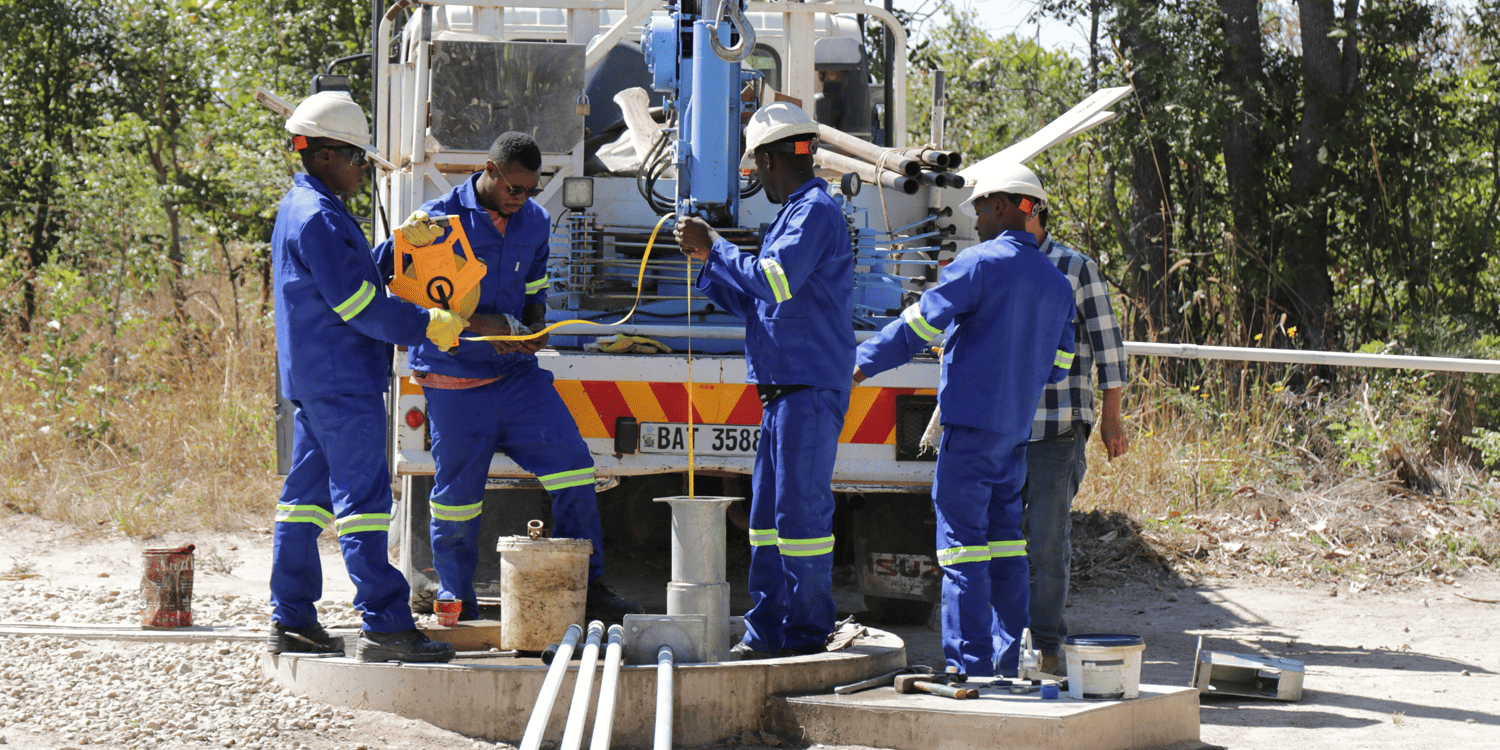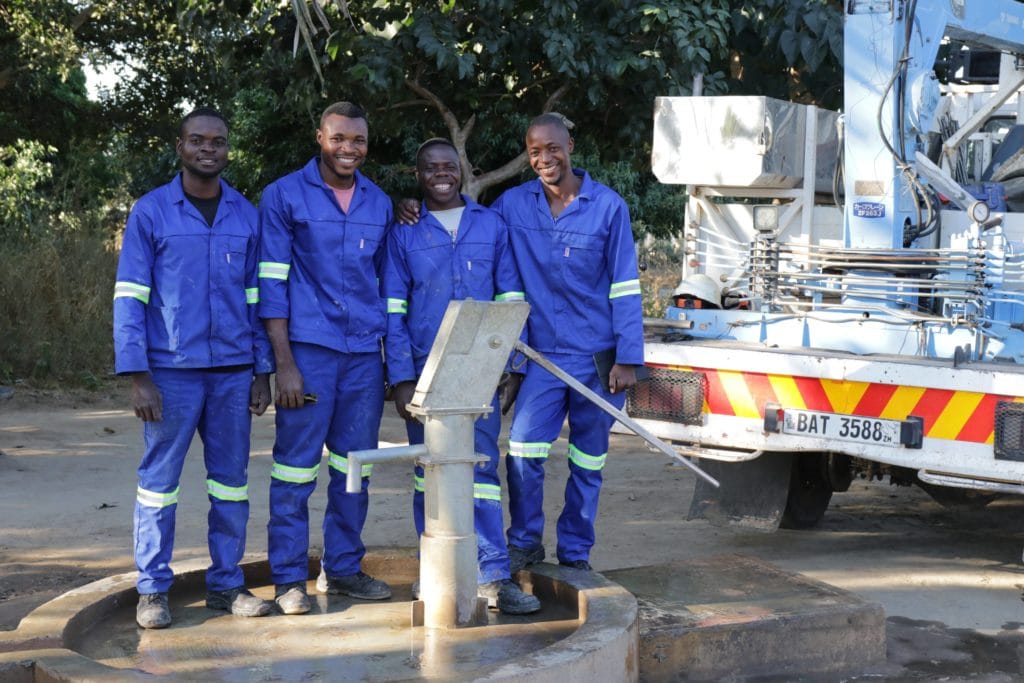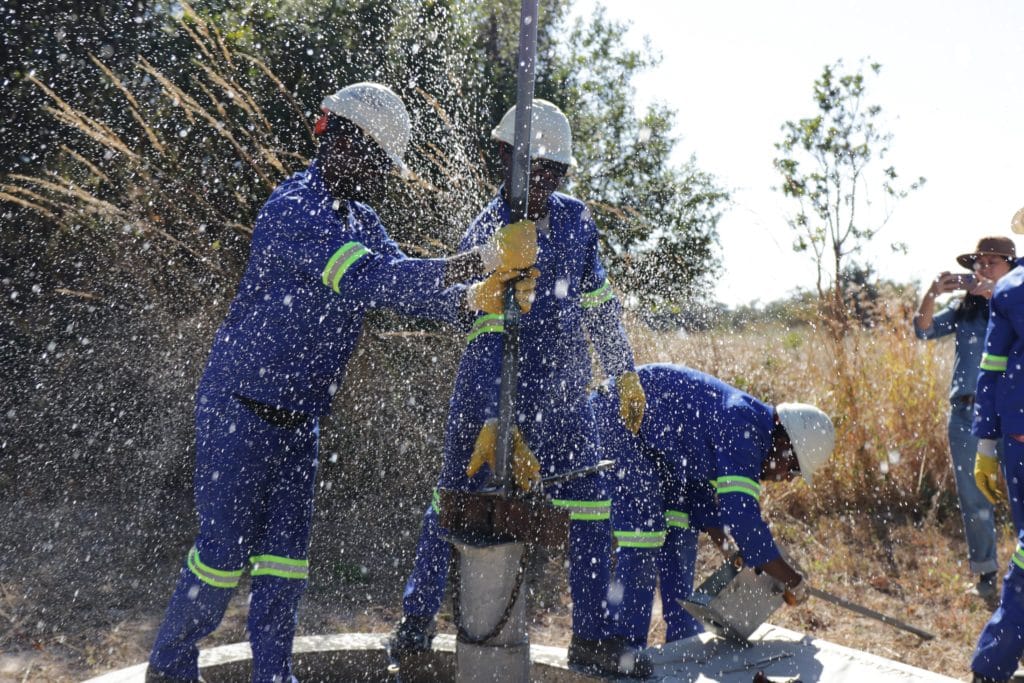
A couple of hours outside Lusaka, the capital city of Zambia, Lukunqoba “Nova” Lupimpi and his three co-workers are stuck. One of the axles of their massive truck is caught on a rut in the road, and the men are lying under the vehicle, chipping away at the hard soil with an ax. Little by little, they free the truck, and Lupimpi and his team are on their way once again.
Today, they are headed to Chimpetu. A little over a year ago, Maranatha drilled a water well in this village, right in front of the Seventh-day Adventist church. But a couple of months ago, the well stopped working. The church leadership called Maranatha, and Lupimpi and his team were on their way — albeit a little delayed — to help.
Once there, the crew talks to the community members about the problem, dismantles the entire well, assesses the issues, and then make the repairs. The entire process takes about 60 to 90 minutes, depending on the severity of the problem. The crew will then move on to the next village in need of help. Depending on the proximity of the sites, Lupimpi’s team will hit up to six well sites a day.
At the last location of the day, when the sun is beginning to dip low on the horizon, the team will set up camp on the church property, cook supper or enjoy one provided by the community, and settle in for the night before they hit the road again in the morning.
This is Maranatha’s well repair team in Zambia. They are one of three teams — based in Kenya, India, and Zambia — started by Maranatha in 2021, focused entirely on the maintenance of water wells in their respective countries.



Searching for a Solution
A search for water charities around the world will generate a long list of resources and organizations designed to aid communities in need of access to clean water. Thanks to these groups and their supporters, tens of thousands of water wells have been drilled. But one of the challenges of wells is maintenance. With hundreds, sometimes thousands of people using a single well every day, there’s bound to be worn and broken parts. As a result, only an estimated 40 percent of the wells drilled around the world are actually operating. With Maranatha having entered the water well arena in 2008, this situation was a frequent topic of conversation among members of the management team.
“Maranatha takes that issue seriously, and we wanted to make a statement that says Maranatha wants to make sure that the water wells that we drill continue to operate over the foreseeable future,” Kyle Fiess, Maranatha vice president of projects, says. “And so, Maranatha [implemented] a series of scheduled maintenance visits to all the wells that we drill to make sure that parts are replaced and then to respond to emergencies when a well is broken or stops working.”
Fiess began working with his field staff to outline solutions. In the three countries where Maranatha has been most prolific and current in providing wells, they created a team of road warriors to visit every well drilled by Maranatha for scheduled maintenance. Maranatha also began installing plaques with a helpline number for emergencies.
“When we drill a new water well, we have a data plate on which we punch all the details about the well. And it also has a cell phone number to call for service. So those two numbers are with the repair team. So, whenever we get a call for repair or service, we [enter] it in a register, and then we follow it as soon as possible,” Luke Johnson, Zambia country manager, says.
Between maintenance visits and repairs, the team stays busy. It’s a big job — daunting when you consider that Maranatha has drilled more than 3,100 water wells around the world, including more than 800 in Zambia. But it’s a start. And for those communities that receive the help, it’s a huge relief. When you have no water, life is difficult, but it is, sadly, the norm. Once you receive access to clean water, then suddenly lose it, the disappointment is deep.



A Broken Well
Jackson Chimbala is a member of the Kaloumina Seventh-day Adventist Church. Some time ago, Maranatha drilled a water well on the church property. Prior to this, people in the community had a number of ways to get water, but none were ideal. From dipping into hand-dug wells, which were usually exposed to the elements and contaminated, to walking two hours to the nearest borehole, community members had to risk their health or spend a great deal of time fetching water.
Part of the agreement of receiving any Maranatha well is that its use cannot be exclusive to Adventist church members. It is to be made available to everyone in the community with no strings attached. The gift is a form of outreach, and congregations have actually seen membership grow once a well piques curiosity about the church itself. As a result of this open policy, Chimbala says, the majority of the 500 residents in the area of his church use the well. Then, a month ago, the Kaloumina well broke — a common occurrence with such intense use.
“[The broken well] has definitely been difficult because it has affected the life of the people in one way or another. The water collection has been disturbed,” Chimbala says. “Where do you go again? Should you go back to the old system?”
Fortunately, by this time, Maranatha had implemented the call system, and the Kaloumina church members, who are the official caretakers of the well, called the help line to get on the list for assistance. In time, Lupimpi and his crew arrived and fixed the problem. Two hours later, Kaloumina had water once more.
The difference between well repairs and maintenance is mostly minor. Both typically require the team to take the well apart, either in search of the problem or to ascertain wear and tear. Both typically call for the team to replace all the usual suspects — rods, linings, cylinders, valves, plungers, bearings.
Things get a bit more complicated when something is actually broken, as the team has to play detective to find the solution. Issues that plague wells can range from misuse, such as pumping the handle too hard or at a wrong angle, to abuse, such as children pouring pebbles into the nooks of the apparatus. One of the most difficult tasks, according to Lupimpi, is retrieving a pipe that drops down the hole because of a loose connection or broken socket. Then the team has to use a massive fishing tool to try and retrieve the pipe; it is an endeavor that can take up to six hours.
But with every visit, the team gains new insight into how to fix or prevent the issues with better materials and education for the user. Long-term sustainability is the goal.
For Lupimpi, every challenge — even fishing for pipes — is worthy work. The best part of the job, he says, is to see everyone’s face light up with smiles when the well starts working again.
“That smile is what motivates me,” he says.
Lupimpi is originally from Zimbabwe. He got his start working with Maranatha in 2012, when crews were in Bulawayo, Zimbabwe, to build the Maranatha Adventist High School. Over the years, Lupimpi moved into well installation, which is the work of placing the pump and pouring the concrete pad and lip around the well. Then in 2021, he moved to Zambia to lead the team for well maintenance and repair.
The work is hard, but just as clean water has been an answer to prayer for hundreds of communities, these wells have been an answer to his prayer as well. He’s doing the work he has always hoped to do: missions.
“Before I joined Maranatha, I always loved to be a missionary — that is one of my greatest desires. And after joining Maranatha, I actually came to understand that God has answered my prayer. I’m a missionary. Though I’m not preaching the word … what I am doing right now is God’s work. And it’s impacting people’s lives in a very positive way.”
The original version of this story appeared in The Volunteer, Issue 4, 2023. Maranatha Volunteers International is an independent supporting ministry and is not operated by the corporate Seventh-day Adventist Church.